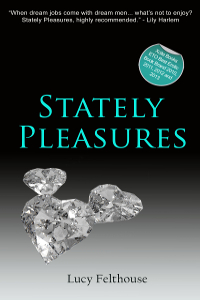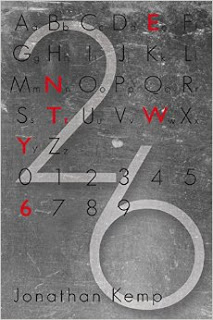by Jean Roberta
I learned a new word recently, and that’s always a good thing for a writer.
While reading a list of available books for review that was sent to me by Dr. RS, long-term editor of The Gay & Lesbian Review (Massachusetts, formerly produced at Harvard University), I noticed this title:
Love’s Refraction: Jealousy and Compersion in Queer Women’s Polyamorous Relationships by Jillian Deri (University of Toronto Press, 2015).
I asked RS if I could have it for review. He said I could, but he suggested that a shorter review might be better than a longer one, even though another member of his posse of reviewers had advised him to devote a theme issue to polyamory. He suggested to me that any book with the word “compersion” in the title is probably too abstract and obscure for readers of a scholarly queer magazine.
He sent me the book anyway, and I soon learned that “compersion” means the opposite of jealousy: a feeling of shared joy that results when one’s lover acquires a new playmate or friend-with-benefits. The fact that “compersion” is less-well known than “jealousy” is a clear sign that in Western society, only monogamous couples are considered normal, and that jealousy (even when it inspires murder) is assumed to be the normal reaction to any violation of the monogamous bond.
Even for those who have been “out” as gay men, lesbians, bisexuals or transpeople for many years, the dominant model of sexual/romantic commitment has enormous gravitational pull. RS’s comments about the large, fascinating concept of polyamory showed what looks to me like a queer (inconsistent) streak of conservatism. Although we have been exchanging emails for years about books which may or may not have relevance for an educated LGBT audience, we haven’t had any direct philosophical debates about our personal moral codes for engaging in sexual/romantic relationships.
RS did tell me that he considers polyamory to be a largely imaginary condition, i.e. many more people think about it than put it into practise. This seemed to be his main quibble about running a theme issue: is there an actual polyamorous community? If so, where are these people? (When I mentioned the above book to a friend and colleague who grew up on the West Coast of Canada, he suggested that all the women who were interviewed for the book probably live on Commercial Drive in Vancouver.)
When I mentioned RS’s quibble to the local director of the campus LGBT center, s/he (born female, now identifying as male) laughed and said he could put me in touch with quite a few folks who identify as polyamorous, if I want to interview them for a theme issue of The Gay & Lesbian Review. Egad – I already have enough writing to do, even during my summer break from teaching, but what an intriguing research project. The journalist/researcher side of me wants to meet as many polyamorists as possible, and hear more about how compersion actually feels, since I’m fairly sure I haven’t felt it myself.
If there is a thriving community of practising polyamorists in the small city/large town where I live (population about 200,000, government seat of a Canadian prairie province and home of the Royal Canadian Mounted Police), there is probably a bigger tribe of them under RS’s nose in Massachusetts. Their reasons for keeping a low profile seem painfully obvious to me. After all, it wasn’t that long ago that divorce, the sex trade, and homosexuality couldn’t be mentioned on television.
One of the reasons suggested itself when my spouse (the woman with whom I’ve lived for 26 years) asked why I was reading that book, and why the topic interests me. Her anxiety was clear: was I suddenly planning to hook up with women, or men, or both? If so, was I simply going through a kind of post-menopausal frenzy, or was I planning to embrace a new lifestyle? If I was standing on the edge of a cliff, contemplating a leap onto a dozen mattresses already occupied by welcoming bodies, was I planning to discard her as an outworn First Wife?
I assured her that my interest is scholarly, more or less: as an erotic writer, I have already described polyamorous relationships that are intended to last for a lifetime, but I need more information about how such complex connections actually work, and why/when they don’t.
Lest my spouse sound more suspicious or insecure than I am, reading this book has reminded me of painful experiences in my dating past, when “I’d like to see other people” generally meant “We’re done, so get lost.” Women, in particular, are raised in most cultures to be polite and avoid scenes, which might be good training for humans in general, except when it prevents honest communication. The women I dated before the beginning of my current relationship in 1989 often tried to leave me behind by dropping hints and pulling away rather than by rejecting me directly. Their ambiguous behavior included “friends” who suddenly seemed to occupy so much of their time that they hardly had any left for me – but when I asked, they would assure me that we were still an item, and they certainly weren’t breaking up with me. I would rather march through a field of stinging nettles than go back into that swamp of doubt, dread, humiliation, and resentment.
Re the possibility of my spouse jumping off a cliff onto the mattresses below, I’m sure she could find welcoming bodies down there. In her sixties, she is still attractive, engaging, and a long-term community organizer who seems known to half the town. Years ago, when she made an unusual visit to the local queer bar by herself, she was apparently enticed by a male/female couple who regularly trolled the bar for individuals (usually female) to join them for threesomes. Apparently they assured Spouse that they would treat her well and that she had nothing to fear, but (according to her account the next day), she was turned off by their unvarnished lust, and said no. When I heard this story, my feelings were more mixed. Of course they found her appealing, which validated my taste. I knew who they were, and they had never approached me that way – was I less of a babe? What if she had said yes, and what if the couple had wanted to see her regularly, without me? Hookups that turn out to be peak experiences are not guaranteed to stay casual. I was relieved by her ironclad refusal to even consider it.
Reading a book seems safe enough. And I’m committed to the belief that knowledge, even when it’s painful, is usually better than ignorance, even when it’s comforting. For the foreseeable future, I’m willing to continue down a path of asking questions and seeking answers. Comments welcome.








